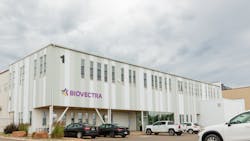Trump’s looming tariffs create uncertainty for Agilent’s $925M buy of Canadian CDMO
Santa Clara, Calif.-based Agilent Technologies was looking forward to the start of 2025, having recently completed its $925 million acquisition of Biovectra, a Canadian contract development and manufacturing organization (CDMO) specializing in biologics, highly potent active pharmaceutical ingredients, and other molecules for targeted therapeutics.
With “world-class” capabilities to support gene editing as well as established biopharma customers in North America and Europe, the Biovectra buy was touted by Agilent as building on its CDMO specialization in oligonucleotides and CRISPR therapeutics, as well as expanding its portfolio of services with sterile fill-finish and rapidly growing modalities such as antibody-drug conjugates and GLP-1s.
However, President Donald Trump on Saturday imposed a 25% tariff on imports from Canada that was supposed to go into effect on Tuesday, creating business uncertainty for Agilent’s Biovectra. For now, Trump has paused U.S. tariffs on Canadian goods for at least 30 days, following a Monday afternoon call with Canadian Prime Minister Justin Trudeau.
“The current U.S. tariffs situation is fluid and uncertain,” an Agilent spokesperson said this week in response to a query from Pharma Manufacturing, declining to comment on how a potential trade war between Washington and Ottawa might ultimately impact Biovectra’s business.
Yet, even before this week’s tense back and forth between the U.S. and Canadian governments, Simon May, president of Agilent’s Life Sciences & Diagnostics Markets Group, warned Pharma Manufacturing in an interview last month about the “volatility and unpredictability” of the geopolitical environment.
“We’re all aware of some of the geopolitical forces in play, for example, and there are some significant elements of uncertainty in terms of how that’s going to play out,” May said.
The sum of its parts
At the same time, May contends that Biovectra’s four facilities in Charlottetown, Prince Edward Island and two in Nova Scotia — employing more than 650 people — combined with Agilent’s existing best-in-class cGMP manufacturing capabilities has well-positioned the company to compete as a fully integrated CDMO.
May said that Agilent’s Nucleic Acid Solutions Division (NASD) with two cGMP facilities in Boulder and Frederick, Colorado is “very much concentrated in RNA oligo synthesis, siRNA, guide RNA, and with the addition of Biovectra, we got some complementary capabilities very specifically in the area of gene editing with nanoparticle production that gives us the opportunity to be a complete service provider.”
In November 2023, Biovectra completed a $90 million-plus biologics expansion — with the Canadian and Prince Edward Island governments as partners — that included a suite of specialized capabilities in mRNA, pDNA, lipid nanoparticle and fill/finish work, which the company claimed is “unique and the first of its kind” in Canada creating significant domestic biomanufacturing capacity for the country.
Biovectra’s 36,000-square-foot cGMP biomanufacturing center in Charlottetown has vaccine and therapeutic production capacity for 160 million doses annually and fill/finish capacity for 70 million doses per year for commercial distribution. The company’s single-use biologics fermentation suite in Windsor, Nova Scotia, provides pDNA and protein by microbial fermentation in a cGMP facility running 100L to 1,000L batches in what is “the only single-use suite of its kind in Canada,” according to Biovectra.
May noted that with Agilent’s acquisition of Biovectra it acquired “state-of-the-art” sterile fill-finish capabilities at the Prince Edward Island site in Canada — as well as microbial fermentation competencies — “which gives us access to a footprint in peptide therapeutics and GLP-1s specifically.”
Overall, he said Agilent saw several “complementary” areas and “near adjacency capability extensions” with Biovectra “which is why we concluded that the two businesses are a very good fit together.”
Looking at 2025, Agilent is approaching this year with “cautious optimism,” according to May. “We’re coming off a couple of years of challenging conditions that we’ve seen across the sector, and I think we’re seeing some green shoots of recovery in the biopharma sector,” he said.
In terms of Agilent’s business when it comes to new therapeutic modalities, May concluded: “We still believe very strongly that the macros in that area are extremely strong and durable, and that we’re well-positioned to capitalize.”
According to Agilent, it has added more than 100 new customers due to its 2024 acquisition of Biovectra. The company expects a gradual recovery in 2025 with Biovectra and NASD projected to be a $1 billion-plus revenue opportunity by 2030.
About the Author
Greg Slabodkin
Editor in Chief
As Editor in Chief, Greg oversees all aspects of planning, managing and producing the content for Pharma Manufacturing’s print magazines, website, digital products, and in-person events, as well as the daily operations of its editorial team.
For more than 20 years, Greg has covered the healthcare, life sciences, and medical device industries for several trade publications. He is the recipient of a Post-Newsweek Business Information Editorial Excellence Award for his news reporting and a Gold Award for Best Case Study from the American Society of Healthcare Publication Editors. In addition, Greg is a Healthcare Fellow from the Society for Advancing Business Editing and Writing.
When not covering the pharma manufacturing industry, he is an avid Buffalo Bills football fan, likes to kayak and plays guitar.
